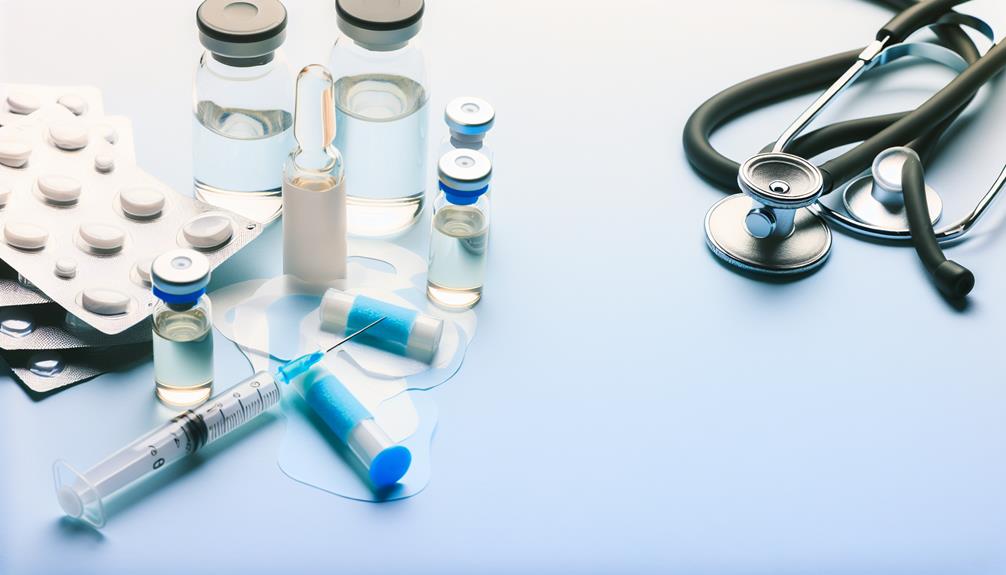I understand that restoring hormone balance in men often involves professional treatments like hormone replacement therapy (HRT). Options include testosterone injections, gels, or pellets, each tailored to individual needs. I find that hormone testing is essential for identifying imbalances, allowing for personalized interventions. Regular monitoring guarantees treatment effectiveness and safety, addressing any potential risks. Lifestyle changes, such as nutrition and exercise, also support hormonal health. Consulting a healthcare professional assures an informed and tailored approach to your specific situation. Exploring these options more deeply can reveal effective strategies to optimize your hormonal well-being.
Understanding Hormonal Imbalance

Many men might not realize the essential role hormones play in their overall health and well-being. The endocrine system, which is responsible for hormone production and regulation, influences various bodily functions, including metabolism, mood, and reproductive health. Hormonal fluctuations are a natural part of life, but when they become imbalanced, it can lead to significant health issues.
In my experience, understanding hormonal imbalance requires a comprehension of how the endocrine system operates. This system is made up of glands that secrete hormones directly into the bloodstream. These hormones act as chemical messengers, coordinating processes such as growth, sleep, and stress response. When there's a disruption—whether due to age, lifestyle factors, or underlying health conditions—hormonal fluctuations can occur.
For instance, testosterone levels naturally decline with age, but external factors like poor diet, lack of exercise, or chronic stress can exacerbate this decline. Research shows that even minor imbalances can lead to a cascade of physiological changes, affecting everything from energy levels to mental clarity.
Additionally, environmental factors such as exposure to endocrine disruptors—chemicals that can interfere with hormone function—can complicate this picture. By understanding the complexities of the endocrine system and recognizing the signs of hormonal fluctuations, we can take proactive steps toward restoring balance. Ultimately, awareness and education are essential for maintaining peak hormonal health and overall well-being.
Symptoms of Hormone Imbalance
I've observed that hormone imbalance can manifest through various common symptoms, such as fatigue, mood swings, and decreased libido. These symptoms not only affect physical health but can also greatly impact daily life, reducing motivation and productivity. Understanding these signs is essential for identifying and addressing underlying hormonal issues effectively.
Common Symptoms Explained
Hormone imbalance can manifest through a variety of symptoms that profoundly impact a man's quality of life. I've noticed that hormonal fluctuations can lead to fatigue, decreased libido, and mood swings. These symptoms often arise when the endocrine system, responsible for hormone production and regulation, becomes disrupted. For instance, low testosterone levels can result in diminished energy and motivation, while elevated estrogen levels might contribute to emotional instability.
In addition to these well-known symptoms, I've found that changes in body composition, such as increased fat deposition and muscle loss, can also occur. These physical changes often correlate with hormonal imbalances, indicating a potential underlying issue within the endocrine system. Sleep disturbances, including insomnia or disrupted sleep patterns, frequently accompany hormonal fluctuations, exacerbating the fatigue I might already be experiencing.
Moreover, I've seen that some men report cognitive issues, such as difficulty concentrating or memory problems. This can be linked to hormonal changes as well. Understanding these symptoms is essential for identifying hormone imbalances, which can ultimately guide effective treatment options. Addressing these issues early can greatly improve a man's overall well-being and restore balance in his life.
Impact on Daily Life
Experiencing hormone imbalance can greatly disrupt daily life, affecting not just physical health but also emotional and cognitive well-being. I've witnessed firsthand how fluctuating testosterone levels can lead to fatigue, irritability, and decreased motivation, which in turn disrupts my daily routines. Simple tasks, like exercising or even getting out of bed, can feel monumental.
Moreover, cognitive functions such as concentration and memory can decline, making it difficult to engage in work or hobbies. This decline can create a cycle of frustration, impacting my self-esteem and overall mood. Social interactions also suffer; I find myself withdrawing from friends and family, fearing they won't understand my struggles.
Research supports this, indicating that men with hormone imbalances often report diminished quality of life and increased feelings of isolation. The emotional toll is significant, as anxiety and depression frequently accompany these physical symptoms. It's critical to recognize these impacts, as they not only influence personal satisfaction but can also strain relationships. Understanding that hormone balance is essential for a fulfilling daily life underscores the importance of seeking professional treatment when experiencing these symptoms.
Importance of Hormone Testing

Understanding the significance of hormone testing is essential for any man seeking to restore balance and optimize health. Hormones play a vital role in regulating various bodily functions, and imbalances can lead to significant health issues. By employing appropriate hormone testing methods, we can gain valuable insights into our hormonal profiles, allowing us to tailor interventions that promote overall well-being.
When it comes to hormone testing, the frequency of tests can greatly influence the effectiveness of treatment plans. Regular testing enables us to monitor changes and make informed adjustments. Below is a table that highlights different hormone testing methods and their recommended testing frequencies:
| Hormone Testing Methods | Recommended Testing Frequency |
|---|---|
| Blood Tests | Every 6-12 months |
| Saliva Tests | Every 3-6 months |
| Urine Tests | Annually or as directed |
Each method has its advantages and drawbacks, and understanding these nuances can help us make informed decisions. Blood tests, for instance, provide a thorough overview but may not capture diurnal variations. Saliva tests can reflect active hormone levels more accurately, while urine tests can offer a snapshot of hormone metabolism.
Overview of Hormone Replacement Therapy
In exploring hormone replacement therapy (HRT), I find it essential to understand the various types available, such as testosterone injections, gels, and pellets. Each option presents distinct benefits, including improved mood and energy levels, but it's also vital to take into account potential risks like cardiovascular issues. By examining these factors, we can better assess whether HRT is a suitable approach for restoring hormonal balance.
Types of Hormone Therapy
Hormone replacement therapy (HRT) encompasses various treatment modalities aimed at restoring hormonal equilibrium in men, particularly when testosterone levels decline due to aging or other health issues. In my experience, there are several effective types of hormone therapy that can be tailored to individual needs through personalized plans.
Bioidentical hormones are often preferred for their chemical similarity to natural hormones, providing a more physiological approach. Among the delivery methods, intramuscular injections are a common choice, allowing for controlled release over time. Alternatively, topical applications and oral medications offer convenient options for daily use. Hormone pellets, which are implanted subcutaneously, release hormones steadily and can last for several months, providing a long-term solution.
Peptide therapies, another emerging modality, are increasingly recognized for their potential benefits in hormone regulation. These can serve as adjunctive therapies, enhancing the overall effectiveness of traditional HRT methods. Each option presents unique advantages and considerations, making it essential to consult a healthcare provider for guidance on the most suitable therapies to restore balance effectively.
Benefits of Therapy
The benefits of hormone replacement therapy (HRT) are increasingly supported by clinical evidence, revealing a range of positive outcomes for men experiencing hormonal imbalances. I've found that therapy effectiveness often translates into improved quality of life, which is echoed by numerous patient testimonials. Many men report enhanced energy levels, better mood stability, and increased libido after undergoing HRT.
Here's a summary of the key benefits that I've observed:
| Benefit | Description |
|---|---|
| Increased Energy Levels | Many men experience a significant boost in energy. |
| Enhanced Mood Stability | HRT can help mitigate feelings of depression and anxiety. |
| Improved Sexual Function | An uptick in libido and performance is commonly reported. |
| Better Muscle Strength | Testosterone therapy promotes muscle growth and strength. |
| Enhanced Cognitive Function | Some studies suggest improvements in memory and focus. |
Potential Risks Involved
While many men experience significant benefits from hormone replacement therapy (HRT), it's important to be aware of the potential risks involved. HRT can lead to treatment complications such as increased risk of cardiovascular events, including heart attacks and strokes. Research indicates that testosterone therapy might elevate hematocrit levels, leading to a higher likelihood of blood clots.
Moreover, long-term effects of HRT remain a topic of ongoing research. Some studies suggest a link between prolonged testosterone use and an increased risk of prostate abnormalities, including benign prostatic hyperplasia and possibly prostate cancer.
It's also essential to take into account psychological impacts; some men report mood swings or increased aggression. Additionally, there are concerns regarding effects on fertility, as testosterone therapy can suppress sperm production.
Given these factors, I strongly recommend discussing these potential risks with a healthcare professional before starting HRT. Careful monitoring during treatment is critical to manage these complications effectively. Ultimately, weighing the benefits against the risks is significant for making an informed decision about hormone replacement therapy.
Types of Hormone Replacement Options

Various hormone replacement options are available for men seeking to restore balance, each tailored to specific needs and preferences. As I explored these options, I found that understanding the differences can greatly impact the effectiveness of treatment.
Here's a brief overview of some common methods:
- Bioidentical hormones: These are chemically identical to the hormones naturally produced by the body, making them a popular choice for those seeking a more natural approach to hormone regulation.
- Synthetic hormones: Unlike bioidentical options, these are manufactured and may not perfectly mimic the body's hormones. They can be effective but may come with different side effects.
- Pellet therapy: This involves the insertion of small pellets under the skin that release hormones over time. It offers a consistent hormone level and eliminates the need for daily applications.
Other methods include injectable testosterone, which provides rapid absorption and can be adjusted based on individual needs, and topical applications like gels or creams, which are easy to use and allow for flexible dosing. For those dealing with broader hormonal issues, options like thyroid hormones and adrenal support may also be relevant, especially for those considering fertility treatments or engaging in hormone cycling.
Ultimately, the right choice will depend on personal health history and lifestyle, so it's essential to consult a healthcare professional to determine the best path for restoring hormonal balance.
Benefits of Testosterone Therapy
Experiencing testosterone therapy can lead to a range of notable benefits for men grappling with low hormone levels. As I've explored the research and clinical findings, it's clear that testosterone therapy not only improves physical well-being but also enhances emotional health and overall quality of life.
Here's a concise overview of some notable testosterone benefits and therapy advantages:
| Benefits | Description |
|---|---|
| Increased Muscle Mass | Testosterone therapy can help improve muscle strength and mass. |
| Enhanced Mood | Many report improvements in mood and reduced feelings of depression. |
| Better Cognitive Function | Some studies indicate enhanced cognitive abilities and focus. |
| Improved Libido | An increase in sexual desire and performance is commonly experienced. |
The evidence supporting these advantages is compelling. Research shows that men undergoing testosterone therapy often report considerable improvements in energy levels, motivation, and overall physical performance. The correlation between testosterone levels and mood stability is particularly striking; many men find that therapy alleviates symptoms of anxiety and depression.
Additionally, with a better libido and sexual function, men experience heightened intimacy and relationship satisfaction. Ultimately, the choice to pursue testosterone therapy should be made in consultation with healthcare professionals, ensuring that it aligns with individual health needs and goals. By addressing low testosterone levels, men can reveal a range of benefits that greatly enhance their lives.
Lifestyle Changes for Hormone Balance

To achieve ideal hormone balance, I've found that making targeted lifestyle changes is essential. This includes adjusting nutrition and diet, establishing a regular exercise routine, and implementing effective stress management techniques. Each of these factors plays a significant role in regulating hormone levels and overall well-being.
Nutrition and Diet Adjustments
Many men don't realize that nutrition plays an essential role in restoring hormone balance. I've found that making specific dietary adjustments can greatly impact hormone levels. It's not just about what you eat; it's also about when you eat. Meal timing can enhance metabolic processes and optimize hormonal responses throughout the day.
Incorporating superfoods into your diet can provide remarkable benefits. These nutrient-dense foods help regulate hormones and improve overall wellness. Here are a few adjustments I recommend:
- Add healthy fats: Foods like avocados and nuts can support testosterone production.
- Include lean proteins: Chicken, fish, and plant-based proteins help maintain muscle mass, which is vital for hormone regulation.
- Opt for fiber-rich foods: Whole grains, vegetables, and fruits can aid in the detoxification of excess hormones.
Regular Exercise Routine
A well-structured exercise routine can greatly enhance hormone balance in men. I've found that incorporating a mix of strength training, aerobic exercises, and flexibility workouts can notably impact hormonal health. Strength training boosts testosterone levels, while aerobic exercises improve cardiovascular health, which is essential for hormone regulation. Flexibility workouts, like yoga, can enhance recovery routines and reduce injury risks.
Engaging in sports participation and outdoor activities also plays an important role in maintaining workout consistency. Group classes can provide exercise motivation, making it easier to stick to your routine. Personal training can further personalize your approach, ensuring you target your specific hormonal needs effectively.
Here's a quick reference table summarizing the key types of exercises and their benefits:
| Type of Exercise | Benefits |
|---|---|
| Strength Training | Increases testosterone levels |
| Aerobic Exercises | Improves cardiovascular health |
| Flexibility Workouts | Enhances recovery and reduces injuries |
| Group Classes | Boosts exercise motivation |
Incorporating these elements into your routine can create a holistic approach to restoring hormone balance, leading to improved overall health and energy.
Stress Management Techniques
While maintaining a regular exercise routine is vital for hormone balance, managing stress levels is equally important. Chronic stress can lead to elevated cortisol levels, which disrupt hormonal equilibrium and can negatively affect mood, libido, and overall health. I've found that integrating stress management techniques into my daily life has made a significant difference.
Here are a few effective strategies I've adopted:
- Mindfulness practices: Engaging in mindfulness meditation has helped me stay present and reduce anxiety, leading to better hormonal regulation.
- Breathing exercises: Simple techniques, like deep diaphragmatic breathing, can activate the body's relaxation response and lower stress hormones.
- Consistent sleep schedule: Prioritizing quality sleep has proven vital in supporting my body's natural hormonal cycles.
Research indicates that these stress management techniques not only improve mental well-being but also promote hormonal balance. By incorporating these practices into my routine, I've noticed a marked improvement in my energy levels and overall health. It's essential to remember that stress management isn't just a luxury; it's a necessity for ideal hormone function and overall wellness.
Role of Nutrition in Hormone Health
Nutrition plays a pivotal role in maintaining hormonal balance, impacting everything from mood to metabolism. To enhance hormone health, I focus on several key nutritional strategies. First, nutrient timing can greatly improve hormone regulation; for instance, consuming protein sources post-workout aids muscle recovery and testosterone levels. I also prioritize healthy fats, like omega-3 fatty acids, which are essential for hormone production and can help alleviate inflammation.
Micronutrient balance is critical, as deficiencies in vitamins and minerals can disrupt hormonal functions. I make it a point to consume a variety of fruits and vegetables rich in vitamins D, C, and B-complex. Hydration strategies cannot be overlooked either; adequate water intake supports metabolic processes and helps maintain ideal hormone concentration.
Incorporating anti-inflammatory foods, such as turmeric and leafy greens, can also mitigate the adverse effects of chronic inflammation on hormone health. Fiber intake plays an important role too, as it aids digestion and supports the elimination of excess hormones. I find that meal frequency can influence energy levels and blood sugar stability, so I opt for smaller, balanced meals throughout the day.
Lastly, I pay attention to stress-reducing foods—like dark chocolate and nuts—that can help manage cortisol levels. It's also crucial to regard food sensitivities that might trigger hormonal imbalances. By adopting these nutritional strategies, I can create a supportive environment for hormonal health and overall well-being.
Exercise and Hormone Regulation

Integrating exercise into my routine has proven to be a powerful strategy for regulating hormones. I've found that both strength training and cardio exercises have significant effects on hormonal adaptation. Research indicates that resistance training can boost testosterone levels and increase muscle mass, which in turn elevates metabolic rate. This cycle supports my fitness goals, making it easier to maintain a healthy weight and energy levels.
To achieve ideal results, I've focused on a balanced approach that includes:
- Strength training: Engaging in weight lifting or bodyweight exercises has helped me enhance muscle mass and improve hormonal balance.
- Cardio exercises: Incorporating aerobic workouts supports cardiovascular health and aids in fat reduction, which also positively influences hormone levels.
- Recovery time: I've learned the importance of allowing adequate recovery periods to prevent overtraining, which can disrupt hormonal balance.
I've also noticed that exercise frequency plays a vital role. Regular physical activity, ideally 3-5 times a week, can lead to consistent hormonal regulation. Additionally, endurance training has been beneficial for my overall stamina and well-being. Since implementing these strategies, I've experienced improved mood and better energy levels throughout the day.
Targeted Supplements for Men
Many men find that targeted supplements can play an important role in restoring hormonal balance and enhancing overall well-being. With the right approach, these natural boosters can complement lifestyle modifications, creating a synergistic effect on hormone regulation.
One effective avenue is incorporating herbal remedies, such as ashwagandha and fenugreek, which are known for their adaptogenic properties. These plant extracts can help mitigate stress, a significant factor in hormone imbalance. Additionally, targeted nutrition through proper vitamin support—like Vitamin D and B vitamins—can improve testosterone levels, which are essential for male health.
Mineral supplementation is equally important. Zinc, for instance, has been shown to play a crucial role in testosterone production. Likewise, magnesium is important for various biochemical processes, including hormone synthesis.
Amino acids also deserve attention; L-arginine, for instance, can enhance nitric oxide production, promoting better blood flow and potentially improving performance. Some men may also benefit from performance enhancers that are rich in omega-3 fatty acids, which support overall hormonal health.
Ultimately, targeted supplements should be considered as part of a thorough strategy that includes lifestyle changes. Combining these elements can lead to significant improvements in hormonal balance and overall wellness. By carefully selecting the right supplements and consulting with healthcare professionals, men can take proactive steps toward achieving ideal hormonal health.
Monitoring and Adjusting Treatment

When it comes to restoring hormonal balance, the journey doesn't stop with targeted supplements; it's essential to monitor their effects closely. Regular assessment allows for informed decisions regarding treatment frequency and necessary dosage adjustments. I've found that tracking progress through routine blood tests and symptom evaluations can illuminate how well a treatment plan is working.
To make this process effective, I recommend focusing on these key areas:
- Evaluate hormone levels: Regular blood tests are vital to assess testosterone, estrogen, and other hormone levels, ensuring they're within ideal ranges.
- Observe physical and mental changes: Keep a journal detailing any shifts in energy, mood, or libido. This qualitative data complements quantitative measurements from blood tests.
- Consult healthcare professionals: Engaging with a knowledgeable provider can offer insights and adjustments based on the latest research and my individual response to treatment.
Seeking Professional Guidance
Seeking professional guidance is vital for anyone traversing the complexities of hormone restoration. The intricacies involved in hormonal imbalance necessitate a thorough understanding of both the underlying causes and the various therapy options available. As I explored deeper into this subject, I realized the importance of consulting with hormone specialists who possess the expertise to evaluate my specific condition accurately.
These specialists utilize extensive diagnostic tools, including blood tests and symptom assessments, to determine hormone levels and identify deficiencies or excesses. It's important to remember that self-diagnosis or relying solely on anecdotal evidence can lead to misguided treatments and potential health risks. Working with a qualified hormone specialist guarantees that any therapy options presented are tailored to my unique needs, taking into account factors such as age, lifestyle, and overall health.
Moreover, the landscape of hormone therapy is continually evolving, with new research emerging on the efficacy and safety of various treatment modalities. From testosterone replacement therapy to lifestyle interventions, a specialist can provide evidence-based recommendations that align with the latest clinical guidelines. This kind of informed approach not only enhances the potential for successful outcomes but also minimizes the likelihood of adverse effects.
Frequently Asked Questions
How Long Does It Take to See Results From Hormone Treatments?
When considering hormone optimization, the treatment duration can vary considerably. Personally, I've found that most people begin to notice changes within three to six weeks, but it can take up to three months for full effects to manifest. Individual responses depend on factors like age, health status, and specific hormones involved. It's essential to have realistic expectations and consult with a healthcare provider for tailored guidance throughout the process.
Are There Any Side Effects of Hormone Replacement Therapy?
Have you ever wondered about the potential side effects of hormone replacement therapy? While many people benefit, I've learned that there can be long-term effects, such as increased risk of certain health issues. It's essential to weigh these risks against alternative therapies that might be available. Consulting with a healthcare professional can help navigate these concerns effectively, ensuring you're making an informed decision tailored to your individual needs and health history.
Can Hormone Therapy Affect Mental Health or Mood?
I've noticed that fluctuations in testosterone levels can markedly impact mental health and mood. Many studies indicate that low testosterone may lead to mood swings and increased irritability. When I researched this, I found evidence suggesting that restoring balanced hormone levels often leads to improved emotional well-being. However, it's essential to monitor any therapy closely, as individual responses vary. Always consult a healthcare professional for tailored advice regarding hormone therapy's effects on mood.
What Age Should Men Consider Hormone Testing?
I believe men should consider hormone testing in their late 30s or early 40s, especially if they're experiencing symptoms like fatigue or mood swings. It's essential to be aware of lifestyle factors that can influence hormone levels, such as diet and exercise. Early testing can help identify imbalances before they lead to more significant health issues. Staying informed about these changes can empower us to take proactive steps for our well-being.
How Often Should Hormone Levels Be Monitored During Treatment?
They say, "A stitch in time saves nine," and that's especially true when it comes to monitoring hormone levels. During treatment, I've found that the monitoring frequency should typically be every 3 to 6 months. Testing methods can vary, but regular assessments help guarantee that any adjustments needed are made promptly. Staying proactive not only aids in achieving ideal balance, but it also minimizes potential side effects that could arise from imbalances.
